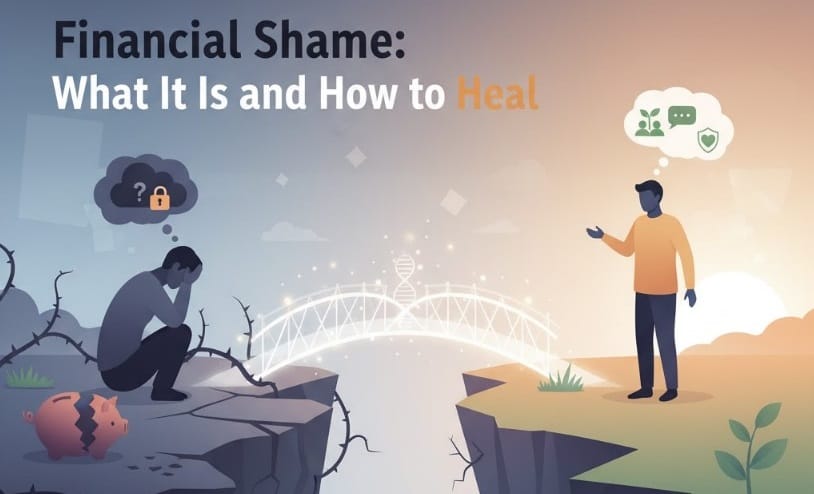Introduction
Money isn’t just about numbers — it’s about emotions.
And one of the most painful emotions tied to money is shame.
Financial shame can make you hide your bank statements, avoid talking about debt, or feel “less than” because of your financial past.
But shame doesn’t fix mistakes — it magnifies them.
The good news? You can heal from financial shame.
By understanding where it comes from and how it shapes your behavior, you can replace it with clarity, compassion, and confidence.
🧠 1. What Is Financial Shame?
Financial shame is the deep sense of unworthiness or embarrassment connected to money — whether it’s about how much you have, how you manage it, or how you earn it.
It’s not the same as financial guilt (feeling bad about a specific decision).
Shame goes deeper — it says, “I’m bad with money,” instead of “I made a bad decision.”
💡 Example:
- Guilt says: “I shouldn’t have spent that much.”
- Shame says: “I’m irresponsible with money.”
This shift from action-based to identity-based emotions is what makes shame so powerful — and so destructive.
💔 2. Where Financial Shame Comes From
Financial shame rarely starts with money itself. It’s often rooted in:
- Childhood messages: Growing up in scarcity or being told money is bad.
- Debt and mistakes: Feeling trapped by past financial decisions.
- Comparison culture: Measuring your worth against others’ success.
- Silence around money: When no one talks about money openly, it becomes a secret — and secrets breed shame.
Social media amplifies this. We see filtered versions of others’ lifestyles and assume we’re failing financially — when in reality, we’re comparing to illusions.
(👉 Internal link idea: link to your article “How to Talk About Money Without Fear.”)
🧩 3. How Financial Shame Affects Your Life
Financial shame doesn’t just impact your wallet — it affects your mental health, confidence, and relationships.
Common Symptoms:
- Avoiding looking at your accounts or opening bills
- Feeling unworthy of success or abundance
- Hiding financial issues from partners or friends
- Self-sabotaging career or income growth
- Overcompensating with overspending or workaholism
Shame thrives in silence — but when you bring it into the light, it loses its power.
💬 4. The Psychology Behind Financial Shame
Psychologists describe shame as an emotion tied to identity and belonging.
When you experience financial shame, your brain links money struggles to your self-worth — creating a loop of avoidance and fear.
It’s also a form of learned helplessness: believing that no matter what you do, you’ll always be “bad with money.”
Breaking this cycle requires separating your self-worth from your net worth.
🌿 5. How to Heal from Financial Shame
Healing financial shame isn’t about quick fixes — it’s a process of self-awareness, forgiveness, and re-education.
Here’s how to start:
🔹 Step 1: Name the Shame
Acknowledge it. Say out loud: “I feel ashamed about my finances.”
Naming an emotion helps you detach from it — it’s something you feel, not something you are.
🔹 Step 2: Replace Judgment with Curiosity
Instead of judging yourself for past mistakes, ask:
“What was I trying to achieve when I made that choice?”
Curiosity invites learning, while judgment keeps you stuck.
🔹 Step 3: Educate Yourself
Financial shame often thrives on confusion.
Learning about money management, debt reduction, or investing helps rebuild confidence and control.
Start small — even a free budgeting app or personal finance podcast can shift your mindset.
(👉 Internal link idea: link to “Best AI Tools for Finance & Productivity.”)
🔹 Step 4: Practice Self-Forgiveness
You can’t punish yourself into prosperity.
Everyone makes financial mistakes — even experts.
Forgiveness frees up emotional energy to make better choices.
🔹 Step 5: Talk About It
Shame hides in silence.
Talk to a trusted friend, mentor, or even a financial coach.
Opening up about your money story helps you see that you’re not alone — and that change is always possible.
💞 6. Building a Shame-Free Financial Mindset
Healing is about reframing your relationship with money.
You can start today by:
- Viewing money as a tool, not a measure of your value
- Setting goals based on values, not comparison
- Celebrating progress, not perfection
- Practicing gratitude for what you already have
A shame-free mindset allows you to approach money with calmness and clarity — which leads to better financial decisions and emotional peace.
💎 7. Turning Pain Into Empowerment
Financial shame can become a source of strength when you choose to grow from it.
Many people who once struggled financially become excellent money managers because they’ve learned empathy, awareness, and discipline through their challenges.
Your financial past doesn’t define your future — it prepares you for it.
Healing shame allows you to write a new story, one built on wisdom, resilience, and confidence.
🌟 Conclusion: You Are Not Your Bank Balance
You are more than your mistakes, your income, or your debt.
Money is just one part of your story — not your identity.
Healing financial shame takes courage, but every small step toward awareness is a victory.
When you replace shame with understanding and action, you reclaim your power — and your peace.
Remember: You deserve financial freedom and emotional freedom — equally.


